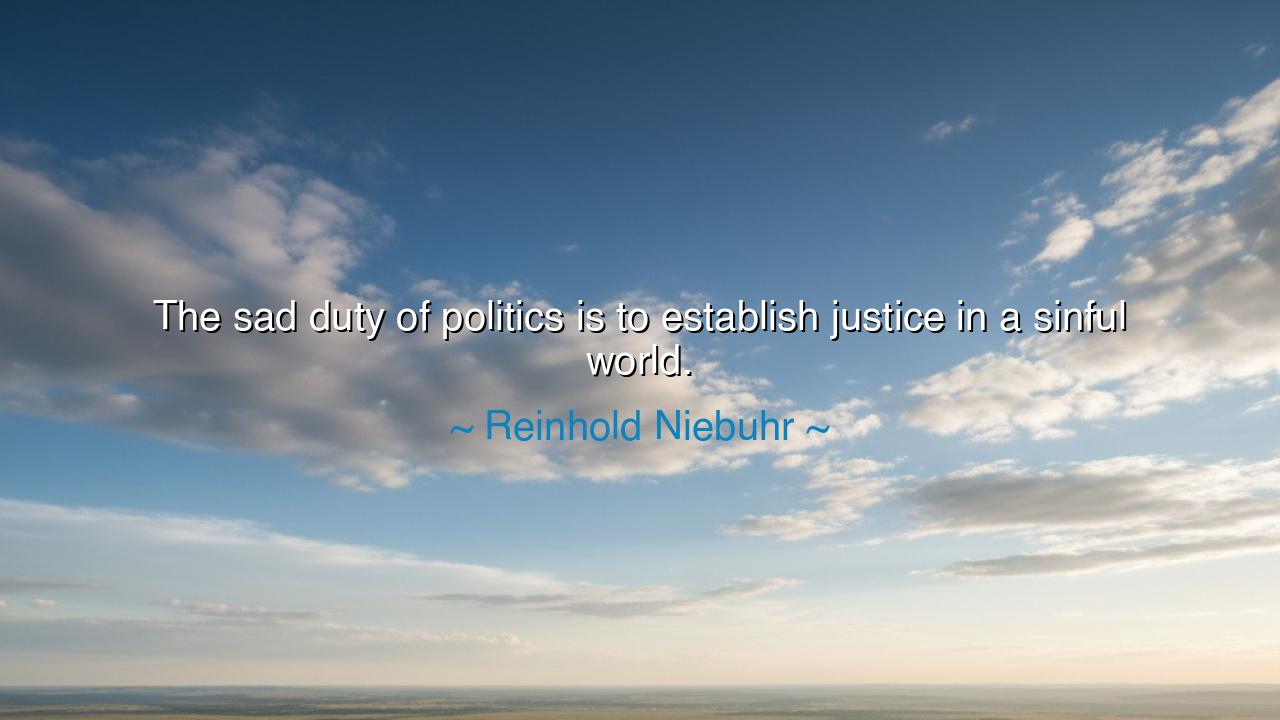
The sad duty of politics is to establish justice in a sinful






In the solemn and enduring words of Reinhold Niebuhr, theologian and moral philosopher of the twentieth century, there resounds a truth both sorrowful and noble: “The sad duty of politics is to establish justice in a sinful world.” It is a statement that carries the weight of centuries — a reflection upon the paradox of human governance and the imperfection of the human heart. Niebuhr, whose lifetime spanned two world wars and the rise of tyranny and injustice across the globe, did not speak these words lightly. He saw firsthand the frailty of humanity — its greed, its pride, its violence — and yet, he believed in the moral necessity of striving for justice, however flawed the world might be. His words are at once realistic and hopeful, acknowledging that politics can never perfect mankind, but can at least restrain its worst impulses.
To understand the origin of this quote, one must understand the soul of Reinhold Niebuhr himself. He was a preacher who became a philosopher, a man of faith who entered the realm of political thought not because he desired power, but because he sought to reconcile morality and reality. Living through the Great Depression, fascism, and the Cold War, he saw that idealism without wisdom led to naivety, and power without morality led to destruction. Thus, when he spoke of the “sad duty” of politics, he meant that those who lead must often act in the tension between the good and the necessary — between the ideals of justice and the compromises that reality demands. Politics, he believed, was not the art of perfection, but the art of preserving what goodness could be preserved in a fallen world.
The ancients, too, knew this sorrow. In the dialogues of Plato, Socrates speaks of the philosopher-king — the ruler who loves truth but must descend into the cave to govern those still bound by illusion. That descent, like Niebuhr’s “sad duty,” is not a joy, but a burden. For those who see the ideal must dwell among imperfection, and those who love justice must often work within the machinery of injustice to achieve it. The same wisdom echoes in the teachings of Marcus Aurelius, the philosopher-emperor, who wrote, “Waste no more time arguing about what a good man should be. Be one.” His reign was filled with wars, rebellions, and moral trials, yet he strove always to govern justly, knowing that no law or army could purge sin from the world, but only contain its reach.
One sees this truth in the story of Abraham Lincoln, perhaps the most fitting embodiment of Niebuhr’s ideal. Lincoln, burdened with the leadership of a divided nation, did not rule with the illusions of purity. He knew that the emancipation of the enslaved, though righteous, would come only through blood and sorrow. “If slavery is not wrong,” he said, “nothing is wrong.” Yet he also knew that in the pursuit of justice, men would kill and die, and that no victory could erase the tragedy of war. He bore the contradictions of power with humility, seeking not glory but reconciliation. In his life, we see the living image of Niebuhr’s words — that justice, though imperfectly achieved, is still a divine obligation.
Niebuhr’s phrase “in a sinful world” does not refer merely to religion, but to the moral condition of all humanity. He saw that sin is not confined to individuals; it seeps into institutions, nations, and systems. Power, even when pursued for good, corrupts. Ideals, when enforced without mercy, become tyranny. Thus, he warned that no political order can ever be pure, for it is built by human hands. Yet this realization does not excuse apathy — it deepens responsibility. The tragedy of human nature does not absolve us from action; it makes action all the more necessary. Politics, then, becomes a sacred duty not of perfection, but of balance — to protect the weak, to restrain evil, and to give justice room to breathe amid chaos.
In this way, Niebuhr’s wisdom transcends politics and becomes a mirror for all who would do good in an imperfect world. The sadness of duty lies in knowing that our victories will always be partial, our righteousness mixed with error. But the nobility of duty lies in doing it nonetheless. The just person, like the just ruler, acts not because success is certain, but because conscience demands it. Justice may never reign fully upon the earth, but wherever it is pursued sincerely — in the courtroom, in the council, in the heart of a single human being — there, the divine spark still glows in the darkness.
Thus, the lesson of Reinhold Niebuhr’s words is both humbling and heroic: do not abandon the fight for justice simply because the world is unworthy of it. Strive to make right what can be made right, and accept that the rest lies in the hands of eternity. In your own life, whether you lead nations or nurture families, let your actions reflect the courage to face imperfection without despair. Do not seek purity; seek compassion. Do not demand a perfect world; build a better one.
For in the end, though the world may remain sinful, and politics may remain fraught with compromise, each act of justice — however small — becomes a light against the night. And in the words of Niebuhr himself, “Man’s capacity for justice makes democracy possible; but man’s inclination to injustice makes democracy necessary.” Let that be the creed of all who labor in hope: that though it is a sad duty to fight for justice in a fallen world, it is still the most sacred calling we can ever answer.






AAdministratorAdministrator
Welcome, honored guests. Please leave a comment, we will respond soon